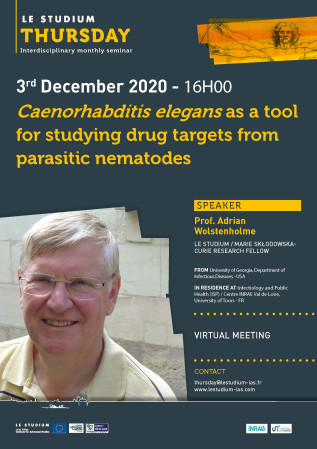Caenorhabditis elegans as a tool for studying drug targets from parasitic nematodes
VIRTUAL MEETING
France
Presentation
Parasitic nematodes, roundworms, cause enormous health and economic problems by infecting people, their animals and crops. These infections can be controlled by the use of effective anthelmintic drugs, leading to ambitious plans for the elimination of some human diseases during this decade. However, our understanding of how these drugs work is still incomplete and the emergence of drug resistance in animal parasites threatens the sustainable control of these infections. Genetic and other experiments on parasitic nematodes are very difficult, due to the need for a host animal to complete the life cycle. Therefore, there has long been an interest in exploiting the free-living species, Caenorhabditis elegans, as an experimental model to study genes for parasites. However, previous methods for doing this are unsatisfactory for a number of reasons, so we propose to develop CRISPR/Cas9 technology – for which the Nobel Prize was awarded in 2020 – to provide a more accurate and realistic expression system. I will summarise progress so far, including an unexpected problem that we are currently working to overcome.
Speaker
Prof. Adrian Wolstenholme, LE STUDIUM / Marie Skłodowska-Curie Research Fellow
FROM: University of Georgia, Department of Infectious Diseases - USA
IN RESIDENCE AT: Infectiology and Public Health (ISP) / Centre INRAE Val de Loire, University of Tours - FR
Partners of the event






